
|
As society continuously trends toward a higher degree of equality, fairness, and acceptance, we're encountering a blip along that road. As governments try to put the nail in this pandemic's coffin, some people are hesitant to follow instructions – in the form of refusing vaccines.
We've surveyed 1,075 people, including 583 business owners, to learn more about their opinion on how unvaccinated people should be allowed to acclimatize to normalcy – should they be penalized in any way? And if so, how? We'll also touch on COVID-19 fees in relation to how businesses have managed to cover nagging costs and how they subdue other pandemic-related headaches. Read on to learn more.
Respondents felt strongest about unvaccinated people shelling out more money for plane and movie tickets, and many felt the same about restaurant meals and hotel stays, too. Across the board, Democrats were more in favor than Republicans of heightened pricing for the unvaccinated.
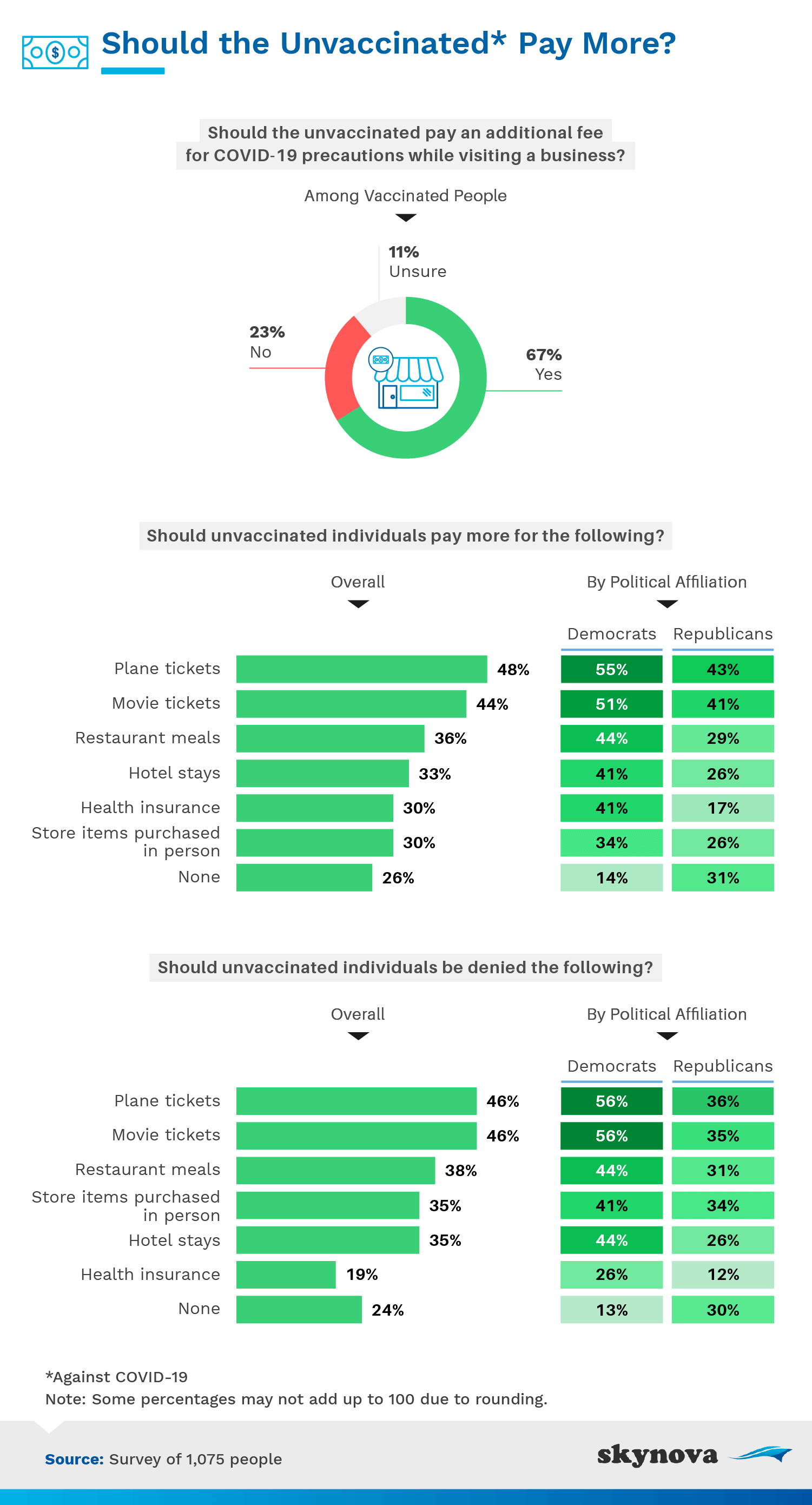
Taking it a step further, a similar trend emerged when asked if unvaccinated individuals should be denied the same things previously mentioned. Once again, nearly half of respondents thought they should be denied the right to plane and movie tickets, and Democrats wanted to crack down harder on this issue than Republicans. Interestingly, data from April to September 2021 show that the vaccination rate in counties that voted for Trump was 39.9%, whereas Biden counties stood at 52.8%. Republicans clearly appeared to be less fazed by the virus than Democrats.
People don't want unvaccinated individuals to pay more for things for no reason – it costs companies a lot of money to handle a positive test in the workplace, and 62% of business owners reported suffering those consequences. Only 13% of business owners said all of their employees had been vaccinated, and 64% would highly prefer it if their workers and clients were protected.
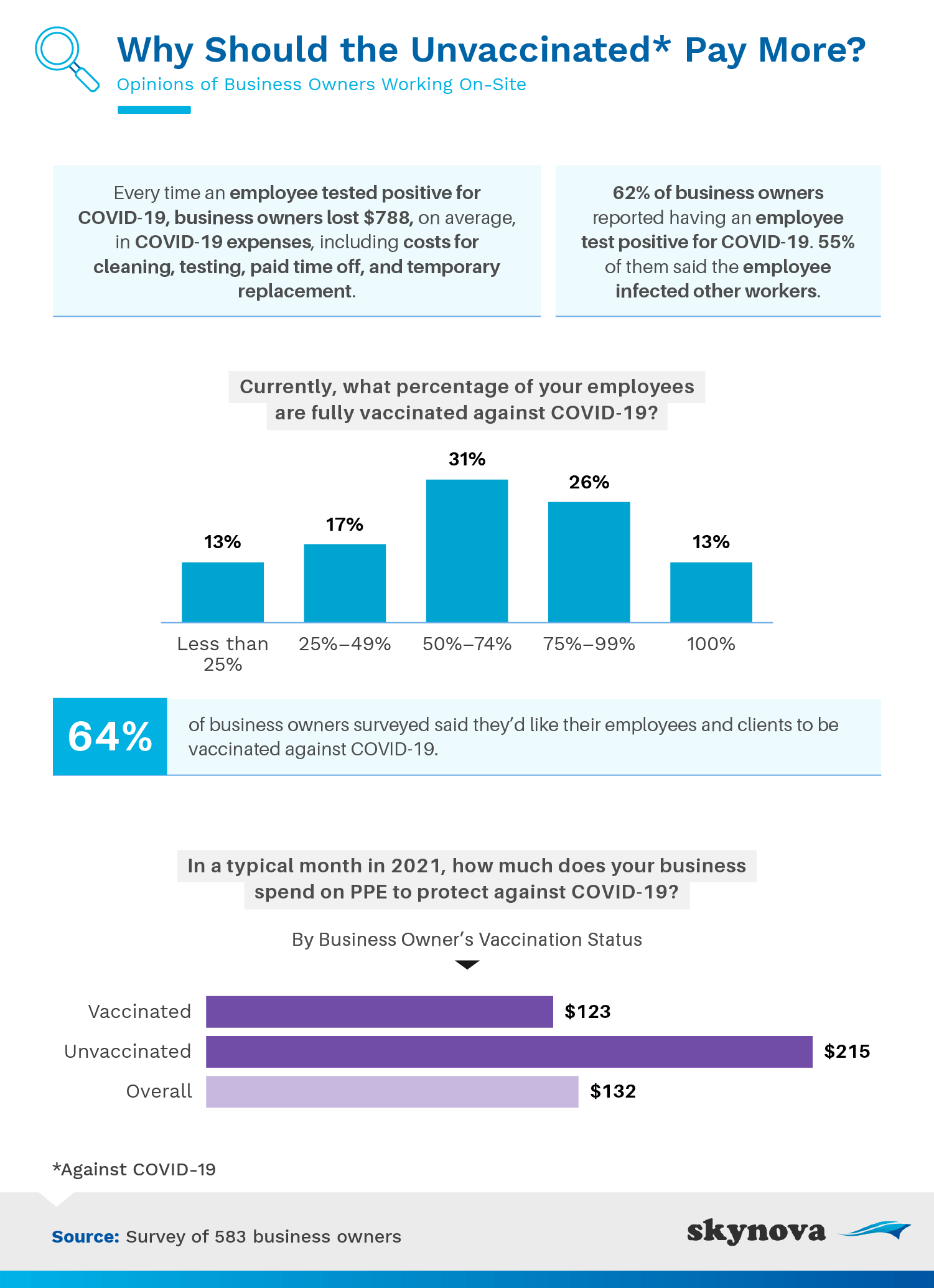
In a typical month in 2021, businesses spent $132 on Personal Protective Equipment, or PPE, to protect their employees against COVID-19. PPE is commonly used in health care settings, but to ensure the safety of their employees and clients, businesses seemed keen on being just as diligent in their own professional practice.
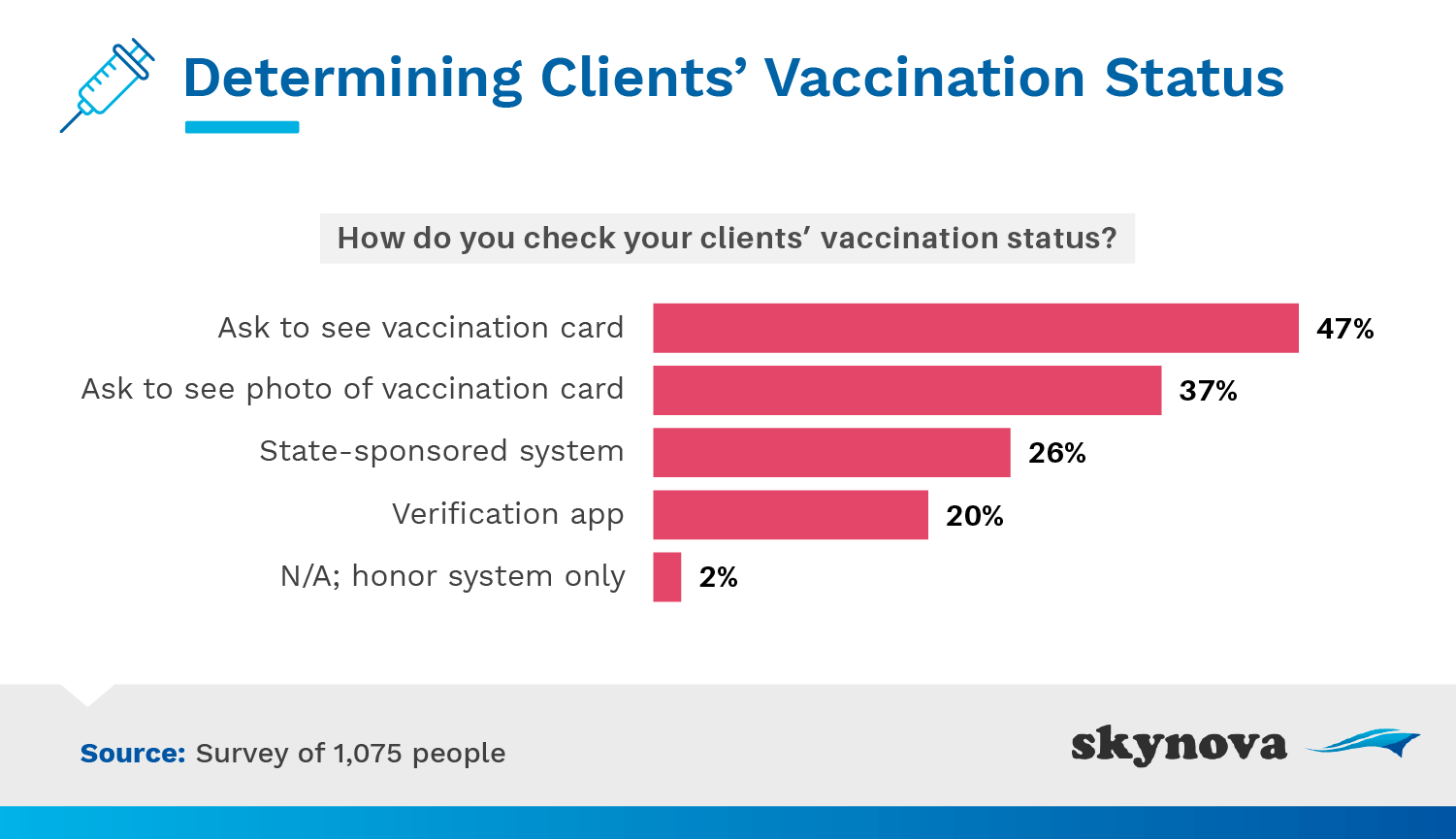
All across the country, states are rolling out different ways to authenticate vaccination status. For example, Utah and New Jersey use a CDC-approved app called Docket, which grants users access to their vaccination records and provides a QR code for vaccination attestation. In states like Colorado, where people can store their proof of vaccination on their 'MyColorado' app, other digital documentation can be stored as well. Generally, business owners asked clients for a physical copy or photo of their vaccine card, but one fifth inquired about verification from an app.
As we know, having a positive COVID test in the workplace can be expensive, which is why 43% of brick-and-mortar business owners reported charging a fee in the name of COVID-19 precautions. While 58% of business owners thought a fee was necessary, only 12% felt that fee should be charged to the unvaccinated. Vaccinated business owners were a lot more likely to charge their clients a COVID-19 fee, compared to their unvaccinated counterparts.
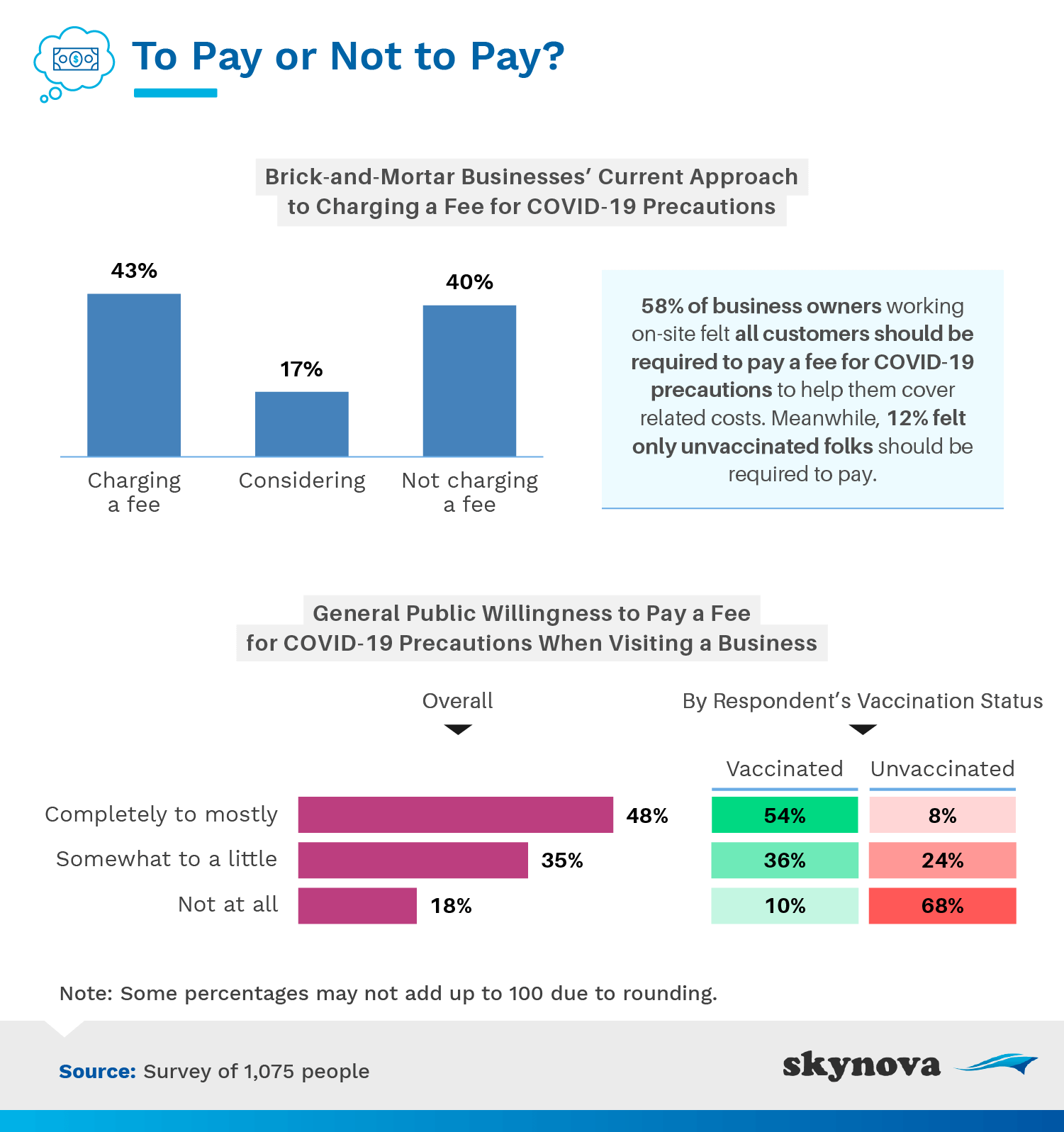
As touched on earlier, 67% of vaccinated respondents were in favor of fees for the unvaccinated, but only a handful of small business owners shared this sentiment.
Nearly half of respondents were mostly or completely willing to pay for a precautionary fee when visiting a business, but 18% weren't interested in doing so at all. According to an article from early 2021, consumers reported being charged anywhere from $5 to $1,200 in COVID-19 fees at places like the dentist's office, senior living homes, and restaurants. Unsurprisingly, it was vaccinated respondents who were on board and unvaccinated individuals who were not.
Most respondents were also supportive of various COVID-19 related procedures that employers instilled – nearly three-quarters were in favor of a vaccine mandate for employees, and more than half wanted the same for customers.
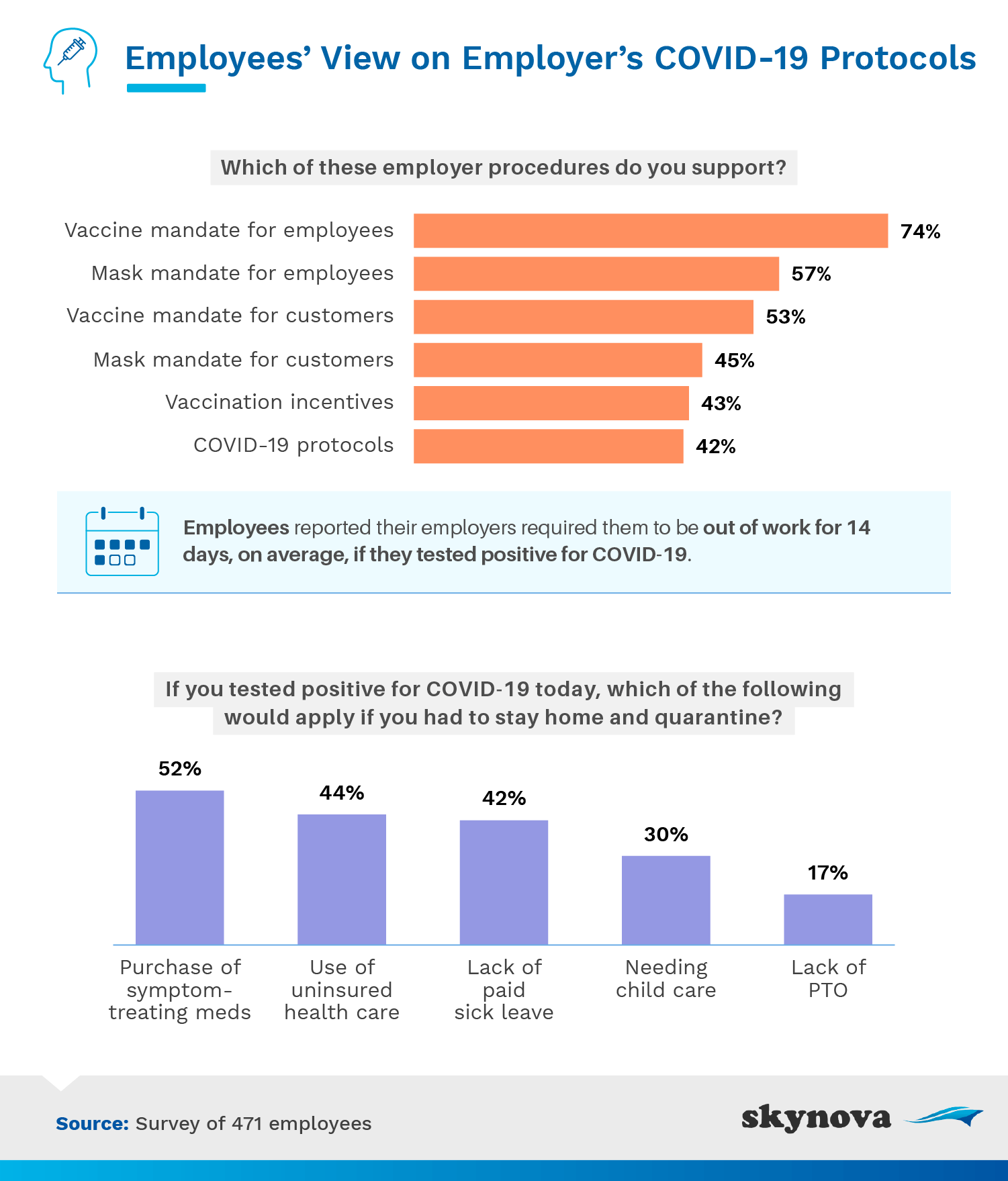
Assuming an employee tested positive for the virus, employers didn't let them back into the workplace for two weeks. If a respondent were to test positive right now, 52% would immediately purchase symptom-treating medications to take during their quarantine period. Up to this point, the FDA has approved only one drug to treat the disease, being an antiviral medication called remdesivir (sold under the brand name Veklury).
Unfortunately, missing work to quarantine comes with even more headaches than just being ill – for example, 44% of respondents lacked health care insurance to cover their medical costs, and 42% wouldn't get paid during sick leave.
The general consensus among respondents was that unvaccinated people should have to pay precautionary COVID-19 fees when visiting a business. Although two-thirds of people were in agreement, only 12% of business owners seemed to be on the same page.
On the employee side of things, if they receive a positive COVID-19 test, they aren't permitted back at work for 14 days. To fast track the healing process, many would seek out medication right away, but others had bigger problems to worry about, such as a lack of health care insurance, unpaid sick leave, and no avenue to safely care for their children during the isolation period. While the vaccination helps protect us against the virus, no one is completely safe. As a collective, we need to do everything we can to make sure people can work and shop freely, and put the pandemic behind us once and for all.
For all of your small business needs, Skynova's easy to use and effective invoicing software can help you stay organized and on top of clients and customers. We also like to write articles, usually tying the workplace to another important area of society (in this case, all things vaccination). To make sure we provide the most interesting and concrete data, we use both primary and secondary sources to find and analyze key points before producing our final results.
We surveyed 1,075 Americans on how they feel about requiring people unvaccinated against COVID-19 to pay extra fees. Among them, 471 were employees in a company, 583 were business owners, and 21 were unemployed. 54% were men, 45% were women, and 1% identified and nonbinary.
For political breakdowns, the sample sizes were as follows:
For short, open-ended questions, outliers were removed. To help ensure that all respondents took our survey seriously, they were required to identify and correctly answer an attention-check question.
These data rely on self-reporting by the respondents and are only exploratory. Issues with self-reported responses include, but aren't limited to, exaggeration, selective memory, telescoping, attribution, and bias. All values are based on estimation.
There are two fierce sides to the vaccination debate – which side are you on? If you know someone who might enjoy reading this article, feel free to share it with them. We just ask that you do so for noncommercial use only and to provide a link back to this page for full access to our findings and methodologies.